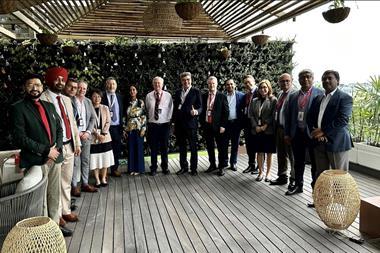How many B747-8 freighter flights between Zhengzhou and Luxembourg can the market sustain? That was the question when Cargolux announced that it was to sell a 35 percent stake to Henan Civil Aviation and Investment Company Ltd (HNCA), an enterprise owned by the Chinese province of Henan.
The deal, completed in April this year, brought with it a plan to launch a "dual-hub strategy", something that was perceived in some air cargo circles as akin to the Chinese province hijacking the iconic European cargo carrier. The rumour mill suggested that the resignation of key Cargolux executives in January, including senior vice president sales and marketing Robert van de Weg and chief operating officer Peter van de Pas, were in protest at the strategy.
Whatever the truth of that, Cargolux is answering its critics with a rapid ramp-up of services to Zhengzhou. Starting flights in June, it increased frequencies to three a week from 2 September and four from 14 October. And that, says Dirk Reich, Cargolux's new CEO, is just the start. "The aim is to have daily flights at the end of the year, and ultimately two or three flights a day," he says.
Nor is this replacing other services to China. A second Xiamen frequency was added in September (on a linked route with Beijing) and the carrier is maintaining its daily flights to Shanghai. That is a massive commitment of capacity to a market that was once the darling of the freighter business but has seemed to run out of steam a bit in recent years, but Reich has no doubt it is the right course.
"We are one hundred percent convinced that China is the key air freight market in the world, and medium term Cargolux will be operating 30 percent of our flights out of China," he says. Given that Cargolux currently has some 130 services a week, that implies 40 weekly flights out of China, (excluding 15 a week to Hong Kong) compared to 14 at present.
Zhengzhou, a city of 8.6 million people in central China, is famous for being home to the Foxconn factory that makes Apple phones. Other than that, the main air freight market in the area is actually textiles, which may not sound that promising. But as Reich points out, very little cargo is produced by Luxembourg either. "In the end the goal is not just to fulfil the demands of the local market, but of the whole of China," he says. "Already the majority of the cargo we move is from Shanghai and Beijing."
But can Zhengzhou really become the Luxembourg of China? In Europe trucking is easy and efficient, on world-class highways. That enables Luxembourg to draw in cargo from all over the continent.
The same is now true of China, Reich insists. "The road infrastructure in China is now excellent," he says. "There are highways to both Shanghai and Beijing and it is one day to both of them by truck. By high speed rail it is just 2.5 hours to Beijing." (And seven hours to Hong Kong: a high speed line to Shanghai is under construction).
Cargolux is in the process of setting up the same kind of trucking network in China that it has in Luxembourg, where it controls 90 percent of trucking activity. Reich says this will be a combination of its own activities and the use of freight forwarder trucking.
Meanwhile Zhengzhou airport is being expanded. A second runway is due at the end of next year and runways three and four are being planned. Reich draws parallels with Dubai World Central - though only on the freight side. "On the passenger side it still has no non-stop flights to Europe and it will probably remain only a regional hub. But on the cargo side the potential is huge."
Despite this he concedes that the infrastructure at Zhengzhou airport still needs further development. "It is not yet enough to handle one million tonnes. But it did 300,000 last year while Shanghai did 4 million, so we definitely see faster growth rates at Zhengzhou. There is also congestion in Shanghai - not just road congestion, but taxiing times which mean you use a lot of fuel on the ground."
But hang about, even with all this potential, isn't two or three daily freighter flights a bit ambitious? Perhaps, but it makes more sense when you factor in Cargolux's transpacific ambitions. It is in the process of setting up a joint venture with HNCA to be named Cargolux China, which will then apply for transpacific rights.
"This will take some time to put in place and it will start with charter flights, and what rights we get obviously depends on the CAAC," Reich says. "But we think that in the worst case it will take two years, and we are very hopeful we will get the rights earlier."
There is still a suspicion in all this that the strategy is being driven by the investment. Having had Qatar Airways abruptly withdraw from owning the 35 percent stake, wasn't Cargolux just desperate to get whatever purchaser it could?
Reich insists not. "We had a number of shareholders interested and we selected the best one based on strategic and financial reasons. In particular we were attracted by the role of China, the size of China, the growth of China."
Perhaps also by a market in which freighter economics have not yet been decimated by rising belly capacity? Reich admits that this is a trend that is making life harder for freighter operators, but sees having an ultra fuel-efficient B747-8F and being one of the last all-cargo operators in the market as an advantage.
He even sees potential for offering ACMI services to combination carriers who are downsizing their freighter fleets: "We did it in the past and we are now going back to it. We believe the ACMI market is bigger than in the past because airlines who don't want to own freighters will still need maindeck capacity from time to time to develop a route."
This is one of the reasons why Cargolux has reversed its former policy of replacing its B747-400Fs with B747-8Fs, and is now keeping both. It took delivery of its 11th B747-8F on 1 October but still has 11-400Fs in its fleet. Three more -8Fs are to come - two next year and one the year after.
As well as ACMI, the larger fleet will allow for the growth in China without cutting other services and be used for the charter market. One source of business here is outsize."Some cargoes need either a B747F or an Antonov 124, and I am guessing that with the Ukraine crisis not so many AN-124s will be available as in the past."
Reich is also adamant that there are many scheduled markets where with the right route planning - and the right cost base, something that has caused friction with the unions - freighters still have a future. "Look at Kenya - flowers from there will continue to be a business long term, and there are also flows out of South America. Asia and the transpacific will continue to be key markets.
"We also have cargo, for example, from the US to Africa or China to Latin America. This is the upside of being a global carrier, rather than a trade lane specialist that has to concentrate on low yield cargo."










